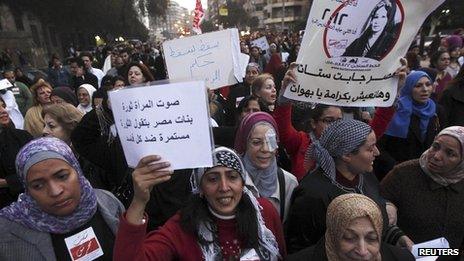Why are sex attacks on the rise in Tahrir Square?
- Published

The testimony of women assaulted in Tahrir Square in recent weeks is shocking.
One report documented by an NGO concerns a woman whose genitals were lacerated using a bladed weapon during another assault.
On the internet, you can even see mobile phone footage of women in the square during demonstrations suddenly being surrounded by dozens of men, and carried away as they are groped and assaulted.
"People who pretended to help were actually harassing me more," says Shorouk al Attar, who was seriously assaulted with her sister close to the square during a protest last year.
"Everyone was holding me, pretending to take me out of the crowd but actually they were harassing me," Shorouk told us.
"It was hard to differentiate between who was helping and who was harassing. I heard some people laughing."
Shorouk says that after the attack she became scared to go outside.
"I spent three or four days alone at home," she said. "I couldn't stop thinking about it and crying. I kept asking myself 'why did this happen to me?'"
'What do you expect?'
A shocking number of women are asking the same question. In a single day in January, 22 serious sexual assaults were reported in Tahrir Square.
There have been protests in Cairo calling for the attacks to stop. But it is an indication of how bad things are, and how some resent even the raising of the issue, that some people attending those demonstrations have themselves been attacked.
So who is carrying out the sexual assaults in Tahrir Square?
"If you are here and you see a girl dressed in an indecent way, what are you going to do? You can't help it."
So said one of a group of young Egyptian men, hanging around close to the square, when we asked about the increase in sexual assaults against women there.
"We are depressed, we can't find jobs and money, what do you expect?" says another of the youths, who was unsurprisingly reluctant to give his name.
Over recent years, Egyptian women have become used to sexual harassment, particularly in large crowds. Eid holidays in downtown Cairo had become particularly hazardous.
Now, it appears, protest gatherings in Tahrir Square, the home of the country's revolution, have become the big draw for young Egyptian men and boys wanting to leer, harass and now to even carry out assaults.
Attacks 'orchestrated'
The young men we spoke to admitted they went to the square to look at women, and though they did not admit to being involved in serious assaults, their manner suggested they saw no problem in harassing women.
They even found the issue of rape something of a joke.
"If women don't want it, they shouldn't wear tight clothes and they shouldn't come here," one laughed.
But is the recent increase in frequency in assaults more than just a social problem that has spiralled well out of control? Is there something even more sinister at play?
Some victims think so, including Shorouk al Attar, who was attacked as she attended a demonstration against President Mohammed Morsi and his Muslim Brotherhood.
"There's the theory that if you want to break a society you start with women because if you do this men will become afraid," she says. "I think it's organised. It's not by chance, like most people think."
The argument that the Muslim Brotherhood has organised the attacks to deter women from attending protests is one espoused by some other activists and women's support groups.
"Why else are the attacks concentrated where the demonstrations take place?" says Nevine Ebeid, from the New Woman Foundation, a group that documents attacks against women.
She does though acknowledge that solid proof is hard to come by, and that most of the evidence through testimony is circumstantial.
'Against Islam'
While the problem of sexual assaults in public gatherings began well before the revolution, Ms Ebeid feels that the political and social climate that has come with the rise of the Muslim Brotherhood has made things worse.
"Political Islam has meant there is a discourse opposed to women's rights," she says.
"It does not believe that there is equality before the law and helps create a climate that encourages sexual harassment and sexual violence against women in Egypt."
It is a charge that has been strenuously denied by the Muslim Brotherhood.
"We are against any assault, especially sexual assaults," says Essam El Erian, the vice-chairman of the party's political wing. "Our religions, Christianity and Islam, prevent us from such."
Mr El Erian also reacted angrily to the theory the authorities were directly involved in orchestrating the attacks in Tahrir Square to stop people protesting, and instead blamed opposition groups for causing chaos.
"Tahrir Square has been captured by some of the revolutionaries," he says. "They are responsible for any case of sexual assault there."
For the last few months, opposition protestors have occupied Tahrir Square. It is closed to traffic and police have retreated beyond its boundaries.
Vigilante groups have started to operate to try to fill the security void and to protect women, but with limited success.
Even if police were present, respect for - and indeed fear of - the security forces has certainly diminished since the revolution and it is hard to imagine women would be safe from harassment in a large crowd here.
Whether or not the authorities are behind some of the attacks is hard to say, but there is little doubt the issue of sexual assault is not being taken as seriously as it should be; by politicians, security officials and throughout Egyptian society.